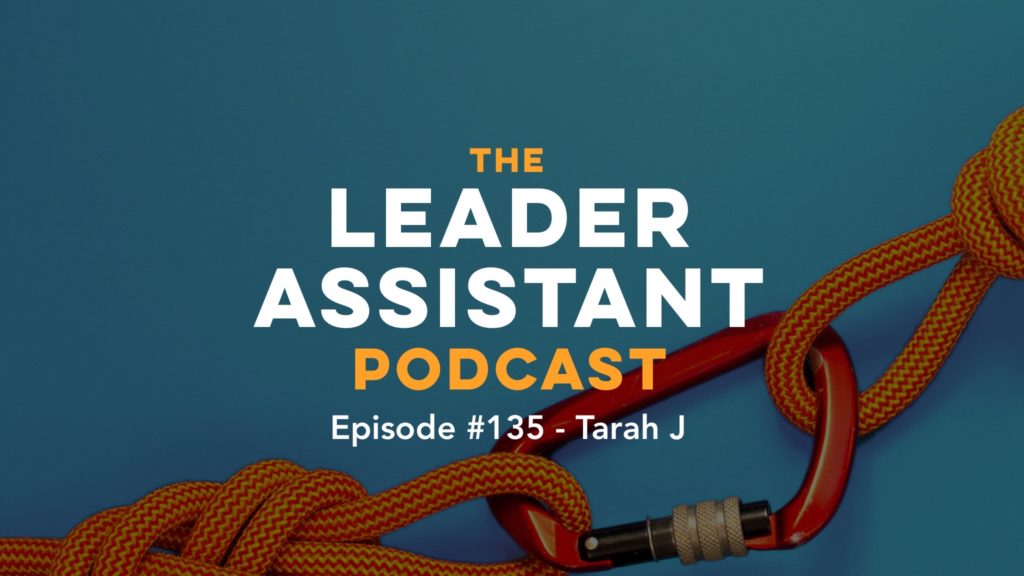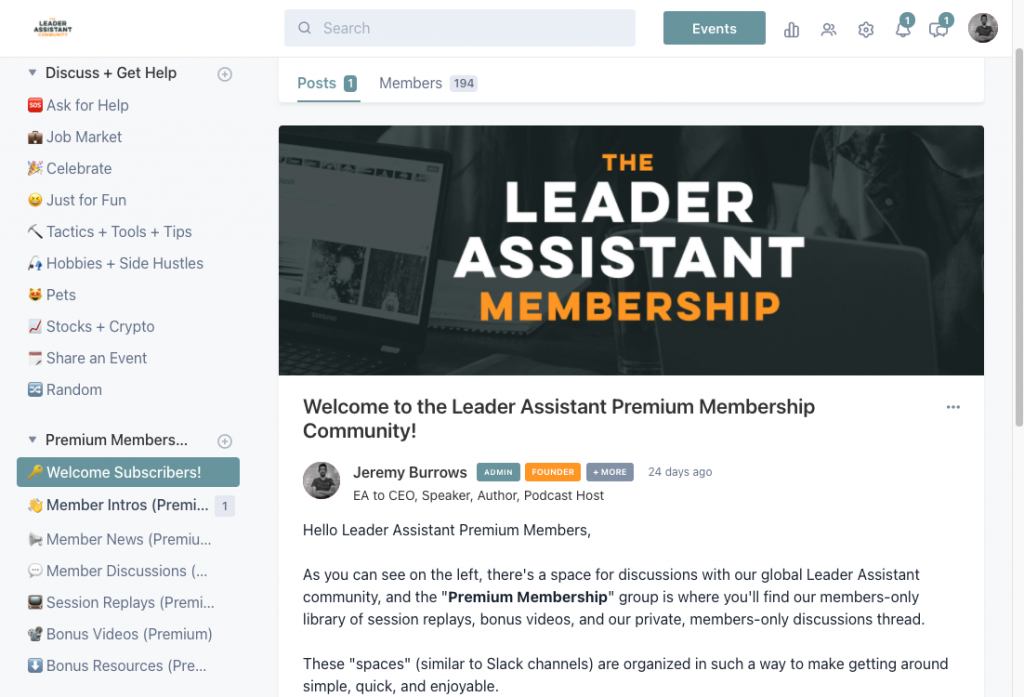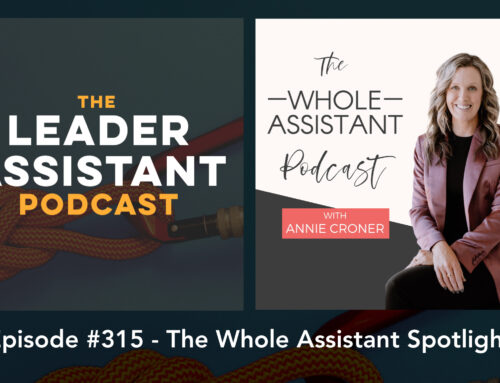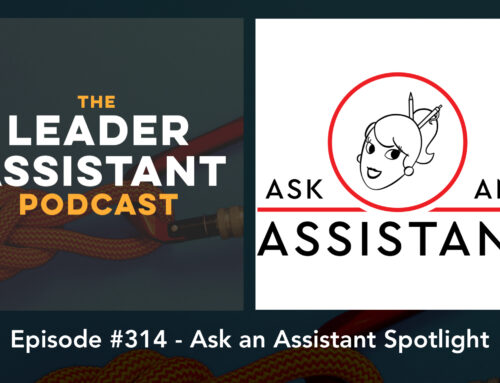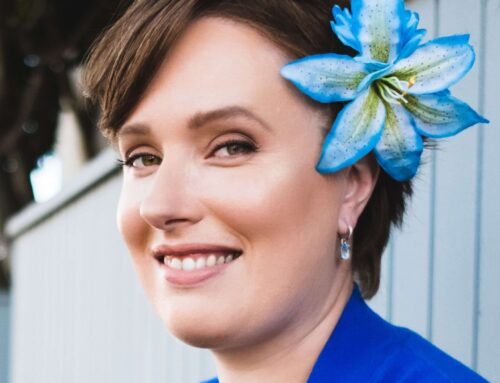Tarah J is the executive assistant to the chief marketing officer at PODS. She has over 10 years of administrative support experience, including many years at Estée Lauder Companies in New York.
In this episode of The Leader Assistant Podcast, Tarah shares her EA career story, tips for leading your executive(s), and advice for new assistants.
I really enjoyed Tarah’s energy and passion for the EA profession and trust you will too!
CONNECT WITH TARAH
LEADERSHIP QUOTE
Make it better, become better, or leave it alone.
– Tarah J
ABOUT TARAH
- Haitian heritage, Florida native
- Career EA/admin with lots of trial and error to get to where she is today
- Lived in NY for 6 years worked for mega beauty patron, Estée Lauder
- Moved to FL when her mother was diagnosed with cancer
- Is now learning to be an EA in a new industry
THIS EPISODE’S SPONSOR
Turn your messages into tasks with Office Otter!
THE LEADER ASSISTANT PREMIUM MEMBERSHIP
To learn more about how you can join the now 200+ growth-minded Leader Assistants, check out our Leader Assistant Premium Membership for ongoing training, coaching, and community.
LEADER ASSISTANT LIVE EVENTS
Check out our constantly updated schedule of events for admins and assistants at LeaderAssistantLive.com.
THE LEADER ASSISTANT BOOK
Download the first 3 chapters of The Leader Assistant: Four Pillars of Game-Changing Assistant for FREE here or buy it on Amazon or Audible.
JOIN THE FREE COMMUNITY
Join the Leader Assistant Global Community here, or the Facebook Group here for bonus content and to network with other assistants who are committed to becoming leaders!
SUBSCRIBE
Subscribe to The Leader Assistant Podcast so you don’t miss new episodes!
You can find the show on Apple Podcasts, Spotify, Google Podcasts, Pandora, and Stitcher.
Join my email list here if you want to get an email when a new episode goes live.
LEAVE A REVIEW
If you’re enjoying the podcast, please take 2 minutes to rate and review the show on Apple Podcasts here. Each review helps me stay motivated to keep the show going!
—
EPISODE TRANSCRIPT
Tarah J 0:00
This job requires your heart it does. And I’m a firm believer in that. So if if you realize earlier on that this isn’t it, you’re annoyed at multiple request. It is not for you.
And it’s not going to get better.
Jeremy Burrows 0:19
Amen to that.
Tarah J 0:21
Sorry. I play around too much damn, no, no. Love it stuff for you and let it go because you just got to be a better EA seven years from now just ruining everybody’s day. Don’t do it.
The Leader Assistant Podcast exists to encourage and challenge assistants to become confident game changing leader assistants
Jeremy Burrows 0:47
Welcome to Episode 135 of The Leader Assistant Podcast. Thanks for listening. If you’d like to be on the show, send me an email to podcast at leader assistant.com. And I’d love to have you on. Hey, friends. Just a quick note from our sponsor for this episode. Office otter automatically makes tasks from your Slack email or text messages. If you’re like me, you wear a lot of hats as an ETA. And I’m sure you struggle to stay on top of emails, Slack zoom calls and the 1 million tabs you have open. So you get to the end of your week. And you think what did I even do this week? Well, office otter helps you centralize your messages, prioritize your tasks, and track your performance. Their co founder Shayanne shared her story in Episode 134 of this podcast, you can check that out and leaderassistant.com/134 To hear her story and how she decided to launch this tool for assistance. But in the meantime, sign up for free at officeotter.com And start unloading that mental checklist. Again sign up for free at office otter. That’s o t t e r.com. All right, I hope you will check out officeotter.com. And I hope you enjoyed this interview. Hey friends, thanks for tuning into The Leader Assistant Podcast. It’s your host, Jeremy Burrows. And I’m excited today to be speaking with Tarah J. Tarah. How’s it going?
Tarah J 2:18
Hey, I’m well how are you?
Jeremy Burrows 2:20
Good. Tarah. So tell us about a couple of things. One, what city are you in and to where do you currently work?
Tarah J 2:28
Sure. So I am currently in the Tampa Bay area. And I work at pods. Pods as a relocation moving company. You seen our containers around I’m sure. So at some on some highway, you’ve seen our containers. And I support that Chief Marketing Officer been there since April. So you know, prior to that I was in New York, I was working at the Estee Lauder companies. And we’ll get into that it’s been a wonderful, wonderful journey.
Jeremy Burrows 2:55
Nice. And so pods is actually who we used to move across the state of Missouri. So I very easily are with them. It was an awesome experience. You know, it was very nice. Logistics. Yeah, there you go. It was nice to just load everything in there. And then just went because we had to we had to crash my parents place for a couple months while we found a house. And then once they finally found the house, we had to rehab it. So it was great to just have everything in the pot. And then when we were ready say Hey, bring it over. So anyway,
Tarah J 3:31
yeah, our containers are loved and beloved and I, I’ve I’ve taken a few road trips since I’ve moved back to Florida. And whenever I see a Potts container, I am besides myself, I literally lose it.
Jeremy Burrows 3:45
Nice. Awesome. Well, so yeah, let’s talk a little bit about your career. So kind of rewind and tell us about maybe your first role in the you know, after high school or college and then how did you end up getting into the executive assistant career?
Tarah J 4:04
Yeah, well, you know, my story is, I think probably different than most people I started working for my mom. My mom, you know, migrated to this country around at 19 years old. And you know, she is truly this you know, American dream. It’s, it’s really inspirational when I when I really think about how far our families come. But I started working for my mom, my mom was super ambitious entrepreneur, starting as we know, entrepreneurship is very difficult. And she was a single mom at some point and I was helping her start a business as a little girl working. And that led and too late into high school and going into college. My mom had a solid mortgage business that she had been running for years. And I just I did my part I joined the family business, helped her run in the office helped her run at home when I could and that So that’s where it really started, you know, it was a very natural skill I just did what needed to be done. You know, it’s very customer facing and focus anything mortgage and real estate related, as you know, is it’s personnel, it’s emotional, you know, people, you’re essentially kind of making someone’s dreams come true or not. So it was an interesting space to be in. And my mom loved real estate, just because I think her story was coming to the country and then buying her first home, that was such an achievement. And I think that moment, it stuck out to her so much that she chose it as a career at some point in her life. So that’s how I started. And I, you know, I did that in college. That’s how I kind of gotten what, you know, the got my money. And after graduating, I, you know, I had what had maybe a week, a week left in college. And I said, you know, what, I’m going to New York. And I graduated on the third and the fourth, I was out. And I, you know, I hadn’t had no plans, really. And I landed at a small publishing house that is actually still open, and they opened in 2014. So I wanted to I supported, I supported the creative editor. And it was weird, it was weird, because I was kind of essentially leaving a family environment, going into another one, but it wasn’t my family. And I think there I kind of, I kind of got discouraged in the role because I was, I was facing, you know, this creative side of, you know, I love to write and that was something that I, I worked on as English wasn’t my first language. So I caught myself writing for fun and writing to fulfill kind of this, I want to be a great English speaker, a dream of mine, I you know, French is my first language. So when I when I was in that role, I was kind of battling, you know, do I want to be a writer? Do I want to focus on the admin role? And that didn’t work out that didn’t work out at all. And I found myself in New York, maybe a year into graduating and really struggling. I’m really struggling. And I, you know, I think that’s where, for me, I think that’s where the opportunity came for me to really fall in love with the EA role. I started temping as temping in Manhattan is a wonderful experience. And, you know, I had no benefits no 401k no vacation days, but I was it was baptism by fire as well. But um, I had a phenomenal experience. And you know, I landed at Marina Mar for small maternity leave, I really learned how to be a CD, a city EA, because I think that’s different than another type of EA, I do think being in New York is a different breed of professionals. And I hope no one’s offended. But that’s my experience doesn’t mean that anyone is not smarter or smarter than the other. That was just the experience that I had, it was a lot quicker and faster than I had anticipated. And that role came to an end and I looked for at work for a month, Jeremy didn’t find anything in 2015. And I said, you know, maybe it’s time to go back to New York and Estee Lauder came into my life and they were in my life for a very long time. So yeah, the very long time and you know, I’ve I left for a while, went to Egon Zehnder, which is a head headhunting firm, spend about 767 months there and went back to Estee Lauder, so there was a little back and forth, which I appreciate it and it was on good terms. And they asked me to come back. But you know, I, that journey in itself was phenomenal. Phenomenal. I wish it for everyone. I if someone ever tells me I’m going to work at the Estee Lauder companies, I would say go, go go go. You are you are and for you are in for a special treat. And right around right around when was it March of 2020. You know, I get a big blow my mom’s diagnosed with cancer. And it’s at the later stage. And at this point, we’re all working from home. You know, that third week of March COVID is kind of ramping through the states and most people are remote. So I literally packed one bag, came to Florida, worked remote for almost a year and you know, with life and how things worked out, I just ended up relocating to Florida. And you know, it’s funny with pods that I want to interviewed for the role and I met my former boss, my current boss now is a newer cmo and she’s fabulous. But when I met my former boss, we just clicked and I said you know I wasn’t looking to move this fast into anything. But her and I we clicked so well and I you know I’ve just when I think about my journey as an AE, Jeremy it’s been so smooth. It’s been so great. People have poured into me so much. And I have a lot of family that doesn’t understand what I do. And I have to at this point in my life, I don’t explain it anymore. Like the role is awesome. You’re missing out. Be nada But that’s that’s how I got here. And I, you know, definitely peaks and valleys, lots of lessons and mistakes. But it’s been great. And I’m in phenomenal hands now. You know, pods is a it’s a wonderful company. There are wonderful, talented, brilliant, kind hearted people. I’m in really good hands. So I’ve been very, very fortunate.
Jeremy Burrows 10:25
Wow. So yeah, that’s a nice, short version of your life story. Thanks.
Tarah J 10:29
I feel like I did you need all of that.
Jeremy Burrows 10:32
That was great. That was great. So okay, so tell us a little bit about a couple things that stood out one, you know, your time in New York and how you said, you know, is fast paced and just kind of a different, whole different world? Do you have any examples of you know, stories of your time in New York, and maybe what? Now, now that you’re in Florida, maybe it’s maybe one of the stories that’s kind of different that maybe would never happen outside of a big city like New York?
Tarah J 11:06
I think everything that happened in New York
it’s I don’t even know how to is it comparable? What. So when I think of my day to day, right, I remember when I when I worked at Estee Lauder, just the individuals that you would sometimes run into the personalities, the brilliant minds, it’s not to say that there aren’t brilliant minds in Florida, but you know, at that level of creativity, they’re running, managing billion dollar brands, really impacting culture. It’s, you know, seeing celebrities or seeing models go from underrated to superstars after they sign that, you know, contract with a brand, it’s, it’s a very different experience. If I can think of something that’s, you know, what I think is different. I think it was the details. Like, I find that in my, I felt, I found that in my former role that it was all about the touch, you know, that high touch, how something was placed on a table, you know, how something was worded, how documents were formatted, you know, that there’s such value. There’s just, it’s so different, and I don’t want to offend my career.
Because it just, you know, it’s just different that people have different priorities or different subtypes. I can’t think of anything off the top of my head.
Jeremy Burrows 12:28
But I mean, even just the details part, like, you know, maybe there’s a little bit more OCD Enos in New York,
Tarah J 12:33
yes, I think there’s definitely a lot more OCD denas I also came from a completely different space, you know, a kind of a space when you’re being creative, anything goes in a way if you think about it. And now, you know, with with pods, I’m, I’m just I’m humbled every single day. And I really, I feel like I’m closer to my, to my team at pods, I feel like I have an opportunity to really listen to people’s stories and see who they are and watch them work. And, you know, I’ve seen a few people get promoted these past few months. And it’s just, I remember when I worked for a larger company, a promotion was an announcement, you know, and then you heard about it. But now I really get to see the person that got promoted, how it changed the, you know, their interactions, and just knowing that this person is so excited to work here. It’s different, because it’s smaller, and I am grateful for that. I love being a part of people’s stories. And I feel that when I worked in New York, it’s just it becomes highly transactional, because you’re going at such a quick pace and you’re trying to get everything done. Everything’s important. It’s urgent, the whole world on fire. The meeting hasn’t started. Where’s the zoom? I need my coffee. I need 30 more meetings by the end of the day, even though I have no time. So And here, it’s just it’s it’s such a more precious experience, I think, and I’m really thankful for that.
Jeremy Burrows 14:05
Yeah, it’s definitely a different pace of life for sure. So okay, so then, do you have any lessons learned or, you know, mistakes that you made over the years that are, you know, a story that you could share that would help those listening who, you know, whether they’re in New York, or Florida, or London, would just, you know, appreciate hearing from someone to let them know that they’re not alone in their challenges and mistakes.
Tarah J 14:40
I can think of so many mistakes, but I think one of the greatest mistakes that I made was I took a wrong job. And I knew it was the wrong job. And so many things happened and I and what happened was I was so attracted to the shiny objects, the unlimited PTO, the food and the fridge. I can Save on lunch food in New York is so expensive Jeremy you know, I get to travel to you know, this state every now and then opportunities that you know, in Arabic EA culture at a different companies are different. So I think the greatest mistake I made was I took the wrong job, even though my my gut said screen now, my gut was saying no. And it happens, it really, really happens. And sometimes, you know, we take the wrong job. Because once we don’t know, we haven’t really developed ourselves to know that we don’t fit in, in this environment, you know. And when that does happen, and to know if anyone’s ever if anyone feels like they’re in a position where I’ve made a mistake, and now it’s you know, it’s impacting my performance, I hate coming to work every day, be nice to yourself, be nice to yourself, and just know that you, you have the same hopes that they had, and hopefully, you know, this, the company’s goals and hopes were, were honest, but you have the same goals and hopes that they did. And this is just a lesson, and it’s not a failure. And I went around kind of with this chip on my shoulder for so long, feeling like I failed, you know, Jeremy, I, you know, I, I’m really close to my family. And I hate giving them bad news. I just hate it. Like, I messed up, or you know, I’m struggling at work or whenever I would struggle in school. So it was it was kind of like this whole experience that I have to have and to say to my mom, hey, you know, I’m gonna have to quit, you know, my manager and I are not on the same page, I’m so miserable, that I’m actually not working. I come to work every day. And I’m completely just not even there. And that had never happened to me before. So just be nice to yourself. Know that, you know, these are lessons, these are great lessons that I’ve learned. But most of all, be mindful of your time, do not stick around. I don’t care if you’ve been at a job for six weeks, if it’s time to go, it’s done. And you know, I think people make an I’m a little bit more radical about this, because I’m learning the value of time. Time is super valuable. And while you’re wasting your time at the wrong job, there’s the right job looking for you. They’re out there looking for you looking for your skills, looking for your passion, and you’re pouring into the wrong place at the wrong time. So that’s, that to me, I think had I made had I not made the choice that I made, I think I would have been in it, I would have had different experiences. And Jeremy, I’m I think our job involves and or requires us to be extremely emotionally intelligent. And it’s just it’s one of those things where I say take it personal. Take your time personally. Do not waste your own time.
Jeremy Burrows 17:48
Yeah. Yeah, well said, What, uh, what other kind of emotionally intelligent tips do you have for like, have you stayed sharp in that area.
Tarah J 18:01
Um, I. So I have tough skin naturally. I have tough skin naturally. But I have learned to understand that most people aren’t emotionally intelligent. So then what that does, it sets an arena for me to read between the lines quickly, you know, and I don’t, I’m, I’m home, maybe I’m high ego and my personal life, but in my work life, I’m low ego on purpose. I roll my sleeves up, I wash dishes, I take the trash out, I do it on purpose, because I always want to make sure that I’m of service because that’s what the role is for. And I never want to step out of that. Because once an EA stops being of service, you become something else, you know, and it’s okay. And it’s okay. If you say to yourself, hey, I don’t want to be any more. I’m not enjoying this, do something else. But I think as a career EA, I truly believe that my job at the core is to be of service and to really be devoted to whomever I’m supporting in whichever whichever capacity. So it’s, it’s not so much how they’re saying it. It’s what what are they saying? What do you need to get out of these out of whatever interaction you’re having to do your job. And also, I’ve realized quickly, if it’s not hurting me, if it’s not impairing my work, if it’s not going to mess up my relationship with my boss, or impact, you know, my character or how people view my character, I don’t care. And those are just rules I set for myself, especially when you work in these giant companies and you’re dealing with so many difficult personalities, you know, so many different priorities. You know, what’s important to me and my boss, it’s not to say that one of their direct reports, initiatives or projects are not important, but respectfully, it may not be important at that time. And how do you how do you navigate that with someone? How do you you know, they’re getting upset because you’re not doing some They for them, right? And you’re on the back end, knowing that your leader doesn’t have the bandwidth nor the capacity to prioritize this, and this person is taking it personally. And this is an example Jeremy, you know, there’s the back and forth, you know, this EA is incompetent. And how do you come out of that and say, Well, I’m not incompetent. It just is what it is. And I set boundaries for myself, I take what I need to take from a conversation and I move on. And again, always of service. At the end, I think something that I’ve learned is if I ever feel like I have an alternate an altercation, but if I feel like I have kind of a rough exchange with someone, because it does happen, us we have to put our foot down, sometimes it is what it is. I always kind of revert and I’m like, Hey, do you need anything else? Or I might follow up after and be like, Hey, I hope that your conversation with my manager was fruitful, are there any follow up items that I can help you with? And that kind of puts it back at the service place where they, you know, I felt like my leaders are now okay, I’m safe with this person, I can trust this person. So that’s a little trick that I learned over time.
Jeremy Burrows 21:04
Yeah, that’s great. And it shows that like, you don’t just care about checking the box off on your to do list of hey, I scheduled that meeting, and I’m done with it, you actually care that that team member gets what they need, and that your executive helps them get what they need. Okay, so what about executives who aren’t really used to having an assistant? Or maybe they’ve had insistent that they’ve never really empowered them? Or they they like to micromanage, and they have struggled to give up control? How would you encourage assistants listening to really try and work well, with an assist, or an executive like that?
Tarah J 21:50
Yeah, I really want if anyone who’s listening, if this is the only thing you take away from this conversation, this is this is what it means to be here. Because this is the thing that I’m learning now, you must set the stage, you must set the stage, even if this leader has never had an assistant, you need to set the stage in a way that if you’re not getting what you want out of that working relationship, at first, if you’re organized, if you’re assertive, if you set your goals like everybody else on the team, right, and they’re smart, they’re nice, they can be measured. If you’re setting the stage for yourself, the plays gonna play out. It really is. And I learned that from one of my C suite, leaders at PAWS, I went into his office, and we were just, you know, he was pouring into me, and I really appreciate that. But he’s like, you know, sometimes you’re not going to get your way with someone because, you know, maybe they haven’t interacted with NEA before, they haven’t interacted in a certain way with someone. And now instead of, you know, having that back and forth, you know, I want to help but you don’t let me help. I want to I want to get in, but you’re not letting me in as your EA, you know, that weird, that weird fumbling space, just set the stage. And it’s going to play out. And that’s something that I do daily, I set the stage with my time I set the stage with my goals, I set the expectation with myself, you know, if I’m taking care of something, it’s taken care of, you don’t need to ask me anything, you know, you can ask if you want to, but you know that I manage everything. And that’s super important. And it’s a broad statement, setting the stage, but basically, it’s owning it own own your job, really own it. And, you know, have have goals that are measurable. And I think our job is so hard to measure, because for the most part, it is very transactional. So is it that I set up 90% of my meetings? No, it’s that all right? I audited my boss’s time. And I feel like they you know, these one on ones don’t need to be an hour. They can be 30 minutes, they can be 45 minutes. You know, I had a discussion with my boss, and that this current boss, but I’m just speaking, I do that Jeremy. And if that’s confusing, let me know. But you know, for example, you know, I’m having a discussion with my boss about which, which leaders, which of your leaders do you feel need your attention the most? So do I do I need to make you know, these one on ones 45 minutes or an hour? You know, I’m not just scheduling to schedule. And, again, you know, we’re learning about the value of time and what your leader does with their time, it kind of falls on you, you know, because my leader doesn’t tell me I can’t cancel meetings. So what I move and what I scheduled, she’s going to do she or he’s going to do what I did, essentially throughout the day, and if I’m not thinking for them, then I’m not setting that stage for a partnership. They’re not going to come to me for you know, bigger projects, and then realize like, Oh, this is my partner.
Jeremy Burrows 24:56
Yeah, that’s great. So what are some specific ways Ways that you manage calendar, like maybe some tips or tactics on managing your executives time. Yes.
Tarah J 25:09
Oh my goodness, I have so many different people.
Jeremy Burrows 25:12
You kind of sprinkled it in a little bit with like, oh, you know, this this hour long meeting only needs to be half an hour. But what yeah, what’s some other
Tarah J 25:18
so I have a rule. And listen, if you don’t agree with me, it’s fine. But this is my role. Rarely do I schedule our meetings? 45 minutes, that’s, that’s my little golden. Whenever someone asks for an hour, I’m like, Yeah, you need 45 minutes, you’re good. If they ask for an hour and a half, and I’m like, Oh, you need an hour. Okay, I see what I see what’s going on. But so how do I manage my leaders? Just golden Golden Rule, do you really need an hour. That’s, that’s something that really has helped me with with time. Now, something that I’m my current boss is not into inbox management, which sucks, because, you know, my former boss was heavily into inbox management. And that kind of let me know what was going on how I was prioritizing and how I was scheduling to the point that we didn’t need to have a one on one, because I went through the inbox and already know what’s pressing. So a tip is every day coming to the office. And instead of, and I say, if you already have a routine, I say maybe try to come in 15 to 20 minutes earlier. And instead of looking at the calendar, and stead of, you know, looking at your to do list, read your leaders and box backwards. So you go from the night before the day before you read, you know, you skim through everything through the night prior. And you stop there, you know, I don’t start with the new day, I don’t start with the new day is inbox until I go through my to do list. And I after that, I read all of those emails from the day prior, make sure I didn’t miss anything. And then I start my to do list. And with the calendar, if I need to change anything from overnight than I do that first thing in the morning, I created a whole process for myself, Jeremy. And when I got an app, I think I might show it to you. So you can see how how I manage my time. So because I’m supporting multiple leaders, but that’s the first thing that inbox is really important. And it’s really helpful, and it helps you, it helps you know what’s going on. When you see things come through the pipeline, you’re not like a deer in headlights, what’s this meeting about, you don’t even know how to prepare yourself for it, how to prepare your leader for it. So that’s my biggest tip, work with that trust with your leader to have access to their inbox, the 45 Minute Rule, the Golden Rule, which I said, and last but not least, and this is really for me, this is really like a big deal. Prioritize your leaders piece before anything else. And this is for me, I just, I have boundaries, I will put my foot down I will not schedule over certain times, when I see that there’s a maximum amount of hours and the week and these are tough rules. After a maximum amount of hours in the week, I no longer schedule, it’s moving to the next week. And that’s the end of it. I will not burn out my leader under any circumstance, they can burn themselves out if they want to have their own meetings. That’s great. But I didn’t do that. I didn’t do that. So you know, yeah, so that’s like, and that’s a big one. Because that means that you put your you’re putting your neck on the line, because your leader might say, Well, that was important to me, Well, so is your sanity and getting home to your kids. That’s important to me. And then now we’re having a real discussion about what’s important to us. And it’s and it’s really out of, it’s really out of genuine care and respect for the person, you know, because you’re not just there to fill up their calendar you’re there to, to create a balance, at least do your best to. And then I’ve had leaders who are back to back to back to back where I can’t give them a break. You know, and I accept that. And what I do in those cases, is I look at meetings that really could happen next week. And I really build relationships with Ebina with other stakeholders and I say hey, listen, be honest with me. And can this happen next week. And then now you know, you’re learning on your own where that person is thinking, Oh, I don’t need that meeting this week, but they won’t say anything, you know, and you’re learning to kind of create this create the time and give the time back to your leaders. So those are my that’s how I’ve succeeded that’s how I’ve succeeded and you know, be courteous, of course, don’t run through people’s calendars. I don’t some you still don’t understand that it’s okay. But be be courteous as much as you can. And that’s that that’s that, you know, I don’t have any magic tricks. I don’t have any magic tricks. I I have a process from morning until 5pm. And I do the same thing every day and my projects shift, I have a time for my projects. But it’s my little process, you know, I know I run a report every Tuesday, it’s in my, it’s in my calendar, it’s in my process, and I run it and I send these reports out. I manage another inbox. And I know that from two to three, I’m doing all those inquiries for those inboxes. So from two to three, you might not hear from me, and it is what I have to do. So that’s that, I hope I answered that the best way that I could,
Jeremy Burrows 30:34
that was awesome. Yeah, I think that you know, the difference. I talk about this a lot in, in my coaching, or my training or the podcast, but the difference between, you know, a leader assistant, and an average assistant, if you will, is that idea that you’re not just sitting around, you know, twiddling your fingers and waiting for things to happen. You’re attacking the calendar, and you’re attacking the inbox, and you’re attacking the projects, and you’re like, hey, you know, my executive does not need to have 12 hours of back to back to back meetings, this meeting doesn’t really need an hour and a half, this meeting could be a 15 minute phone call, like just thinking at that high level, instead of just being in the weeds of okay, I’m just going to schedule this meeting. Sure, I can do that. So thanks for sharing those tips. It’s amazing. Just here, and you know, your passion for the EAA profession. And then also your leadership skills are coming coming through. So thank you.
Tarah J 31:44
Thank you, my friend.
Jeremy Burrows 31:45
All right. So let’s kind of wrap things up. I like to keep these short and sweet. What is one thing that you would tell a new assistant, so somebody just got their first job, maybe they’re a month into it, maybe they start next week? What’s the one thing that you would encourage them with as they get ready to launch their career?
Tarah J 32:13
The EAA role is one of I don’t want to say the only role but it is one of the only roles that gives you back everything you put in, it really is. And you have to work with your heart and your mind and find the balance. And really work from a place of love. And you know, we you know, we’re professionals, so we know what that means. But you really have to work from a place of love, it is not for people who don’t love what they do. And the EA role is it’s so transparent. If you don’t love being an EA, it shows, it really shows it shows in the way that you it shows in your interactions. It shows and you know how when you make mistakes, how do you? How do you say, oh, man, I messed up, you know, when you’re wrong. Do you apologize? So put your heart into it. This job requires your heart it does. And I’m a firm believer in that. So if if you realize earlier on that this, isn’t it, you’re annoyed at multiple request. It is not for you.
And it’s not gonna get better.
Jeremy Burrows 33:34
Amen to that.
Tarah J 33:35
I’m sorry, I play around too much there. No, no. For you and let it go. Because you just got to be a bear EAS every year. So doubt is ruining everybody’s day. Don’t do it. No, but seriously, it is the
it is a work of the heart and eat, you know, you truly you get what you put in is exactly what you get out of it. You put in negativity. I don’t want to say a lack of attention to detail because I have my moments where I’m moving so quickly that I can’t be attentive to every detail. But you know, you put a negative energy you put in a I don’t want to do this you put in uh, why are they asking me for that? You’re gonna get it right back. It’ll, it’ll, it’ll happen in your work. So that is, that is my that is my only advice. You know, I’ve had many times where I’ve had, you know, incidents happen where my you know, you know, my managers, you know, they made me cry, you know, they didn’t look out for me the way they should have and, you know, I had a lot of maturing to do as well Jeremy. But you know, in those moments where I needed to mature and I needed their guidance, and they didn’t feel like doing it because they were too busy. And, you know, I had those moments where I said, I never want to do this again, you know, and I when I found the right leader, I was like oh yeah, I love this job. I was like alright, nevermind. And those moments will come but again And you know, you, if you’re gonna do this, it’s a work of the heart. And it’s not. It’s not just a skill thing, it really is a work of the heart.
Jeremy Burrows 35:12
Well said, Taro well said, I wanted to kind of bring out to the you know, you mentioned early on that English wasn’t your first language, right? And I just wanted to say, you know, you said something about your goal of, you know, being a fluent English speaker or whatever it well, you’re very fluent and very crisp English. And I think it’s very motivational to encouraging to just hear like, okay, you know what this is, this is the goal that you had, and just to hear you talk even, it’s just like a proof of the hard work you put into it. And so anyway, just wanted to say, Mad props to you for that. Oh, thank you. Thank you. Thank you. And also you speak French. Is that right? Yes. So could you say thanks for listening to the The Leader, Assistant Podcast? Oh, gosh. I’m gonna put you on the spot.
Tarah J 36:15
Hold on, hold on. You’re scaring me. This is so embarrassing. All right. Thank you for what do you want me
Jeremy Burrows 36:24
to send just say something like, thanks for listening to the podcast, or thanks for listening to The Leader Assistant Podcast?
Tarah J 36:29
I want to say it in Korea because I’m Haitian and what’s happening at the border right now,
Jeremy Burrows 36:34
but I know that do that then do that. Oh, really? It’s up to you. Okay, are you?
Tarah J 36:39
Would you want me to do it now? Sure. One Captain Dino deputy no mercy ampere for cause your signs. We’re going to now go.
Jeremy Burrows 36:50
Very nice. Very nice. And I’m just going to trust
Tarah J 36:53
French to be a little nervous.
Jeremy Burrows 36:57
Well, I just you know, I’m just trusting that you’re actually saying something like that, because I don’t know what you’re saying.
Tarah J 37:02
I promise you I’m
saying I am saying only nice things. You want to hear a funny story? Yeah.
I was interviewing for this role. And the brand president, you know, he’s the founder of the brand. It’s a brand at Sephora. And he wanted a French speaking assistant. And I was like, that’s fine. I speak in French to my mother. But they were like, you have to interview in French. And I was like,
no, no. I’m like, That is a different kind of French, uh, you know it. That is just No, but you know, that again, you know, if anyone is
if anyone is, you know, in Canada or wherever, just sequel protagonists, you know, at the Super conference, they probably have at least as well, a few few sweating bullets, right. So, just wishing everyone, really great evening, and thank you for listening. That was in French.
Jeremy Burrows 38:04
Love it. Love it. That’s perfect. Thank you so much for doing that. I know, there’s assistants all over the world. So and I’m, I can barely speak English. So I like to use my guests who can speak other languages. So thank you. So okay, so Tara, thanks, again, for being on the show. Where can people connect with you? Do you want them to connect with you? How can they reach out and say hi. Oh,
Tarah J 38:29
that’s awesome. I am currently only on LinkedIn. Yeah, I’m currently only on LinkedIn. Tarjay. I think that’s my LinkedIn profile. I found out tonight that my Skype profile was not what I thought it was.
Jeremy Burrows 38:45
Well, I’ll put the link I’ll put the direct link in the show notes that way. It’s easy for people to find you but yeah, thanks again. Best of luck to you and your family in your entire career. Thanks for being passionate about the executive assistant role and yeah, we hopefully can meet in person someday and yeah, sophomore. Absolutely. Thank
Tarah J 39:07
you so much.
Jeremy Burrows 39:08
Thanks for listening. Check out the show notes at leaderassistant.com/135.
Speaker 4 39:23
Please move you on Apple podcasts. Goburrows.com

